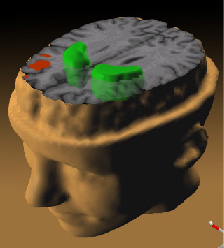Dominic - Neuroscience stories seem to be a theme this week as last Tuesday, President Obama announced the brain initiative which offers $100 million of federal funding to map, in detail, the working of individual parts of the human brain. This will obviously provide vital clues in treating diseases like Parkinson's and Alzheimer's. David, Why do you think this wave of funding is coming now for these kinds of conditions?
 David - Well, it's a prescient topic at the moment, the idea of the aging population. So, the increase in awareness for diseases like Alzheimer's and Parkinson's disease seems to be almost omnipresent. We've got this idea that we need to plough a lot of resources into neuroscience funding so that we can find appropriate treatments for these diseases.
David - Well, it's a prescient topic at the moment, the idea of the aging population. So, the increase in awareness for diseases like Alzheimer's and Parkinson's disease seems to be almost omnipresent. We've got this idea that we need to plough a lot of resources into neuroscience funding so that we can find appropriate treatments for these diseases.
Chris - Do you think $100 million - that's about £60 million. Is that really very much? The human genome project cost $2.5 billion and the Wellcome Trust in the UK, a major funding charity gives away £650 million a year. Neuroscience is a big chunk of that admittedly, but $100 million does not sound like very much to do what they're trying to say they want to do.
David - No, it's not a phenomenal amount of money and if you look at the original application for this project, it was originally a proposal that was $3 billion. That's obviously been scaled back to $100 million proposal. So, in the modern situation, research and technology is so expensive and consumables that you use in the laboratory are so expensive that that money doesn't necessarily translate into lots and lots of new drugs for us to use.
Phillip - Yes, but it is extra money coming in from a source that wasn't there before, so I guess you could say that something is better than nothing. I guess you've got to weigh up, comparing to say, the human genome project, how much do hardware is needed? Can we do a lot of these things with existing techniques so we don't need to necessarily invent new technology?
David - I think the idea of raising awareness of neuroscience research is also a really key point here and I think if we can galvanise the youth of today to then enter neuroscience research and feel that this is something that people find as very important, that that's only going to have a net positive effect.
Chris - The one thing I'm still concerned about there is the sustainability of this because shovelling in $100 million, it sounds great and it's led to a lot of headlines which is I'm sure, partly what they wanted to do - to inject some 'feel good' factor into US and international global research. But at the same time, that's not very much money to do what they're aspiring to do. It's one thing to start it. It's another to keep these things sustained, isn't it?
David - Yes, neuroscience research, like many other areas of research, requires dedication over long periods of time. Sometimes these technologies take decades to go from a conception to the final product. So, we really need to be looking at this over a much longer term.









Comments
Add a comment